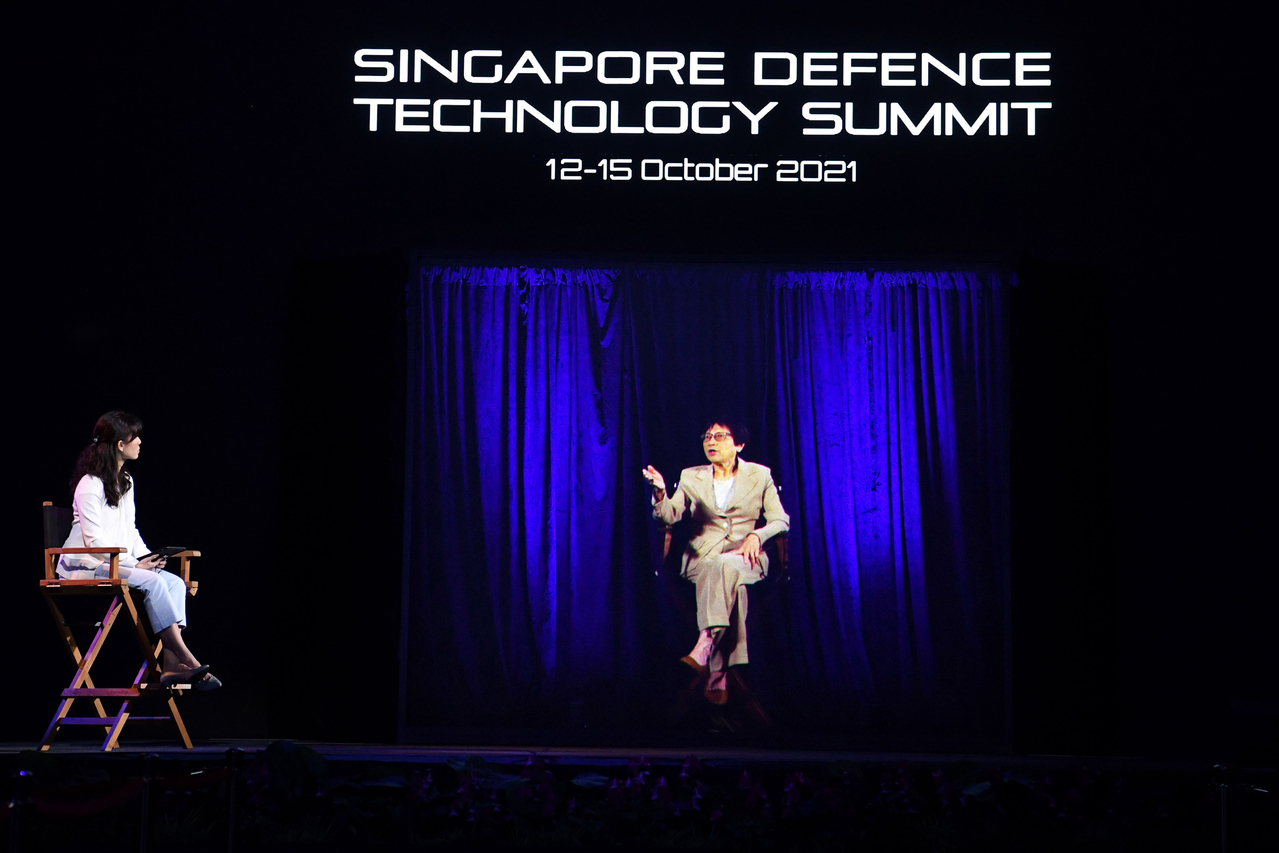Defence sector needs mindset shift to keep pace with tech disruptions: US defence official
Sign up now: Get ST's newsletters delivered to your inbox

Ms Heidi Shyu speaks via hologram technology during the Singapore Defence Tech Summit at Shangri-La Hotel on Oct 14, 2021.
PHOTO: DSTA
SINGAPORE - In the war against obsolescence, the mindset and development processes employed by the defence sector have to change to stay ahead of the latest innovations in technology, said a United States defence official.
Speaking on Thursday (Oct 14) at the third Singapore Defence Technology Summit, US Department of Defence chief technology officer Heidi Shyu said the "very long and very risk-averse process" that defence systems have to go through now has to shift.
Systems being used now are continuously under development and tests, added Ms Shyu, who joined the conference at the Shangri-La hotel live from Washington via hologram technology.
"You've got to rapidly experiment with it, give it to the hands of the user to tell you what are the shortfalls. How should I modify the design, and iterate on the design rapidly?"
Change must also be made to the budgeting process, said Ms Shyu, who is the US Undersecretary of Defence for Research and Engineering.
With the usual two-year budgeting process, by the time approval is given, a technology that was planned to be bought could already be obsolete.
"So the entire mindset and the process that we design, develop and procure weapon systems absolutely have to change."
Her remarks were echoed later during a panel discussion on the third day of the summit, held in a hybrid format with both virtual and in-person attendees, from Oct 12 to 15.
Organised by the Defence Science and Technology Agency (DSTA), the event gathers technology leaders from around the world to discuss issues related to the use of technology in the defence realm.
Dr Emmanuel Chiva, director of the French Defence Innovation Agency, said new ways of thinking and managing innovative projects must be encouraged.
France's next aircraft carrier will be put to sea in more than a decade's time, he noted. "It won't be 5G technologies; maybe 15G or quantum communications technologies.
"We need to accept uncertainty, risks and failure because sometimes you lose and sometimes you learn," he added at the panel discussion titled Beyond Terrorism, Cyber and Pandemics: What's Next.
Mr Mike Sewart, group chief technology officer of British defence tech firm QinetiQ, was asked what needs to be changed by moderator Brigadier-General David Neo, who is deputy secretary of technology at Singapore's Ministry of Defence.
Defence as a sector needs to be the fastest to respond to change as potential adversaries may be even quicker, said Mr Sewart.
"That means we have to do things in a different way. That might be uncomfortable for many of us, but that's the only way we can drive systematic change in a sector that really needs it."
Fellow panellist Hao Li, chief executive and co-founder of Los Angeles-based artificial intelligence (AI) company Pinscreen, said developers of new innovations need to be wary of potential misuses of cutting-edge technology.
Fake media technology or "deepfakes" made possible by AI could also be used in harassment and disinformation campaigns, he added, such as when fake videos of prominent politicians are produced.
Dr Irit Idan, executive vice-president of research and development at Israeli firm Rafael Advanced Defence Systems, said a key lesson learnt from the pandemic in the last two years is the need to be more agile.
People must learn to live in both the digital and physical worlds, and move efficiently between them, she added.
But the demand to be agile also poses a new question for military culture, which thrives on planning, said Dr Chiva. Traditional military development and testing cycles are long, and new technologies need to be incorporated because of fresh threats.
"This means discussing with industry to have open architecture to incorporate those technologies that we don't know what they will be yet. It's all a question of changing the mindset in terms of military innovation and planning."


